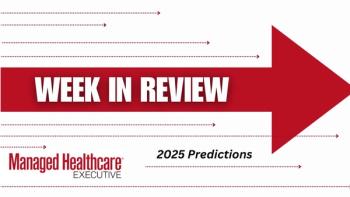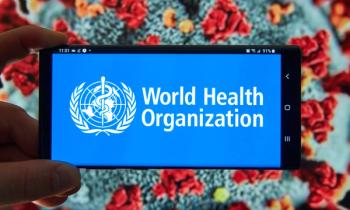
UnitedHealth Group reported a medical care ratio in 2024 of 85.5% compared with 83.2% in 2023.

UnitedHealth Group reported a medical care ratio in 2024 of 85.5% compared with 83.2% in 2023.

A prediction for the year by Brandi Meyers, vice president of Revenue Operations at MDClone.

A South Korean study explored the link between lifestyle decisions beginning in infancy and persistent atopic dermatitis, citing exclusive breast milk diet and childhood obesity as potential factors.

Kim Perry, chief growth officer of Emtelligent, shares her prediction for 2025.

If approved, subcutaneous autoinjector Leqembi will be the only Alzheimer's medication that can be administered at home. The FDA has set a goal date of Aug. 31, 2025.

Study authors Susan D. Reed, MD, MPH, MS, and Erin Dwyer, MPH, both at the University of Washington School of Medicine, attribute some of these different challenges to underlying health disparities.

A prediction of 2025 by Doug Mirsky, Ph.D., vice president of healthcare delivery at Digital Medicine Society.

A prediction for this year by Shawn Gremminger, president and CEO of National Alliance of Healthcare Purchaser Coalitions.

Jerilyn Arneson, Pharm. D, co-founder and officer of the National Association of Medication Access & Patient Advocacy, gives her 2025 prediction.

Centene Corporation’s Ambetter Health Solutions names Alan Silver as the first president of Individual Coverage Health Reimbursement Arrangements.

A forecast for 2025 by Guy D’Andrea, MBA, executive director of Catalyst for Payment Reform.

A prediction for 2025 by Marci Chodroff, M.D., vice president of Medical Affairs at Prime Therapeutics and Managed Healthcare Executive editorial advisory board member.

Kimberly Westrich, M.A., chief strategy officer of National Pharmaceutical Council, shares her prediction for 2025.

Here’s what you missed this week on Managed Healthcare Executive.

Michael Lutz, managing director of Avalere, shares his prediction for the year.

A forecast for this year by Dan Parsons, chief experience officer of Thoughtful AI.

U.S. approved the RSVpreF vaccine for adults 60 years and older in 2023, recommending it only based on individual’s decisions with their doctors.

Predictions for this year from Perry Cohen, Pharm.D., CEO of the TPG Family of Companies and Managed Healthcare Executive editorial advisory board member.

Predictions for 2025 by Tracy Baroni Allmon, J.D., vice president of Market Access and Policy at Magnolia Market Access.

Blue Shield of California new CEO Lois Quam said she will focus on the challenges that members face with accessing healthcare.

Over 20 nonprofit veteran advocacy groups will receive $9 million over the next three years to address homelessness and mental health concerns in veterans.

A forecast for this year by Luis E. Taveras, Ph.D., senior vice president and chief information officer of Lehigh Valley Health Network.

A prediction for 2025 by Michael Meucci, president and CEO of Arcadia.

A prediction for this year from Jason Spangler, M.D., M.P.H., CEO, Center for Innovation & Value Research.

A new, first-of-its-kind study found that these symptoms occur particularly during the late menopause transition and post-menopause.

A Guideline Development Group (GDG) meeting at the end of the month aims to establish new guidelines for lenacapavir, a twice yearly investigational pre-exposure prophylaxis (PrEP) injection.

Modern research shows women’s health issues go beyond reproductive health and highlight women’s elevated risk for autoimmune and cardiovascular disease – among other conditions.

Here’s what you missed this week on Managed Healthcare Executive.

Regenerative medicine focuses on repairing damaged skin and bringing back melanocytes, the cells that give skin its color.

Tafasitamab increased progression free survival by about 9 months when compared to placebo, according to recent study data.